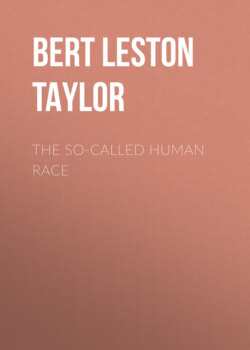Читать книгу The So-called Human Race - Bert Leston Taylor - Страница 21
На сайте Литреса книга снята с продажи.
O WILD! O STRANGE!
“That wild and strange thing, the press.”—H. G. Wells.
ОглавлениеIt’s now too late, I fear, to change,
For ever since a child
I’ve always been a little strange,
And just a little wild.
I never knew the reason why,
But now the cause I guess—
What Mr. Wells, the author, calls
“That wild, strange thing, the press.”
I’ve worked for every kind of pape
In journalism’s range,
And some were tame and commonplace,
But most were wild and strange.
[p 17] I ran a country paper once—
Or, rather, it ran me;
It was the strangest, wildest thing
That ever you did see.
Some years ago I settled down
And thought to find a cure
By writing books and plays and sich,
That class as litrachoor.
And for a time I lived apart,
In abject happiness;
Yet all the while I hankered for
That strange, wild thing, the press.
Its fatal fascination I
Could not resist for long;
I fled the path of litrachoor,
And once again went wrong.
I resurrected this here Col,
By which you are beguiled.
I fear you find it strange sometimes,
And always rather wild.
A delegation of Socialists has returned from Russia with the news that Sovietude leaves everything to be desired, that “things are worse than in the Czarist days.” Naturally. The trouble is, the ideal is more easily achieved than retained. The ideal existed for a few weeks in Russia. It [p 18] />was at the time of the canning of Kerensky. Everybody had authority and nobody had it. Lincoln Steffens, beating his luminous wings in the void, beamed with joy. The ideal had been achieved; all government had disappeared. But this happy state could not last. The people who think such a happy state can last are the most interesting minds outside of the high brick wall which surrounds the institution.
When one consults what he is pleased to call his mind, this planet seems the saddest and maddest of possible worlds. And when one walks homeward under a waning moon, through Suburbia’s deserted lanes, between hedges that exhale the breath of lilac and honeysuckle, the world seems a very satisfactory half-way house on the road to the Unknown. Shall we trust our intelligence or our senses? If we follow the latter it is because we wish to, not because they are a more trustworthy guide.
One must agree with Mr. Yeats, that the poetic drama is for a very small audience, but we should not like to see it so restricted. For a good share of the amusement which we get out of life comes from watching the attempts to feed caviar to the general.
